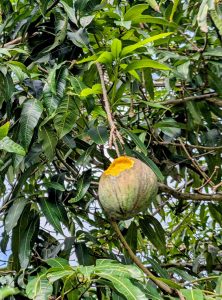Do You Eat Scripture Like a Squirrel or a Raccoon?
I have a mango tree in my backyard. Some years the harvest is plentiful—enough for me and the wildlife that consider the tree their personal buffet table. Other years the harvest is sparse, and I find myself competing with the animal kingdom for the ripe fruit. This year, the summer competition has been in full force.
 One thing I’ve noticed about the animals I’m sharing my mangos with is the difference between how raccoons and squirrels eat. Squirrels will take a bite or two, or maybe a few more, then abandon the fruit, leaving it to waste on the tree or on the ground.
One thing I’ve noticed about the animals I’m sharing my mangos with is the difference between how raccoons and squirrels eat. Squirrels will take a bite or two, or maybe a few more, then abandon the fruit, leaving it to waste on the tree or on the ground.
Raccoons, however, use their forepaws like hands, feasting on a mango until the fruit is picked clean, leaving only the pit barely hanging inside an otherwise empty shell. Every morsel is scraped out, leaving nothing to waste. And they will even do this while the fruit is still hanging on the tree.
hanging inside an otherwise empty shell. Every morsel is scraped out, leaving nothing to waste. And they will even do this while the fruit is still hanging on the tree.
We’re to Feast on the “Fruit” of Scripture
The Bible includes many verses describing how we are to “eat” Scripture. For example:
- 8:3 (ESV) – “Man does not live by bread alone, but on every word that comes from the mouth of the Lord.”
- Job 23:12 (ESV) – “I have treasured the words of his mouth more than my portion of food.”
- Psalm 34:8 (ESV) – “Oh, taste and see that the Lord is good!
- Jeremiah 15:16 (ESV) – “Your words were found, and I ate them, and your words became to me a joy and the delight of my heart.”
- Matthew 4:4 (ESV) – “It is written, ‘Man shall not live by bread alone, but by every word that comes from the mouth of God.’”
As I read these verses, I confess to being convicted. There are times when I read them only on a figurative level. Of course, these figurative descriptions paint word pictures that speak to our spirits. But they are describing a spiritual reality.
What I take in becomes part of who I am and changes who I am. You may recall the children’s song, “O Be Careful Little Eyes.” The lyrics speak of being cautious about what we see and hear and where we go. So how do we consume Scripture?
How Do We Eat Scripture?
Feasting on God’s Word involves intentional choices. Are we intentionally dedicating time to spend in the Bible, reading and studying, and listening to solid Bible teaching? As the apostle Paul wrote in Rom. 10:17 (ESV), “Faith comes from hearing, and hearing through the word of Christ.” And of course, memorizing God’s Word so that it becomes part of who we are. The psalmist declared, “I have stored up your word in my heart, that I might not sin against you” (Psalm 119:11 ESV).
I can recall preparing for exams in school. I would read and study—more like cram—to prepare. I’d read the required books because I had to. But all that work was for the purpose of correctly answering test questions, and then it was gone. A few months later, I could barely tell you the details of what I studied. As the adage says, “In one ear and out the other.”
So Are You a Squirrel or a Raccoon?
Just as eating nourishing food causes it to be assimilated into our bodies and affects our physical health, “eating” Scripture causes it to be assimilated into our spirit, changing how we think, speak, and behave.
So are we squirrels or raccoons? Do we nibble a bit of God’s Word here and there, just enough to be superficially familiar with the Bible? Or do we feast on the fruit of God’s Word, savoring every morsel, taking in as much as we can so that the Holy Spirit can use it as a scalpel to pierce “to the division of soul and of spirit, of joints and of marrow, and discerning the thoughts and intentions of the heart” (Heb. 4:12 ESV)?
Today, will you purpose to feast on God’s Word like a raccoon?






0 Comments